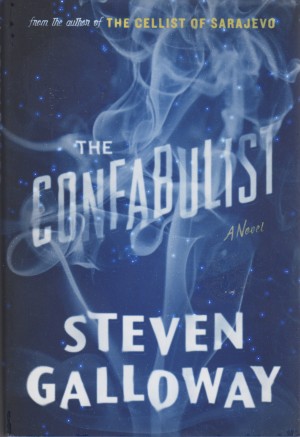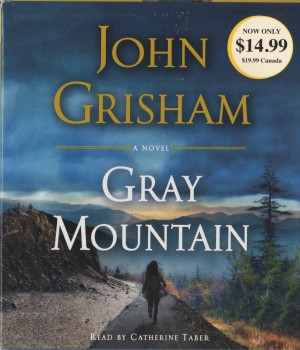
The Confabulist by Steven Galloway (201. Riverhead Books. ISBN 9781594631962)
Two true confessions. First, from the time I saw an article about Houdini in a 1917 copy of Life magazine stacked amongst hundreds of other copies of that seminal 20th century periodical, and then watched Houdini starring Tony Curtis as the ill-fated magician, I was enthralled with the story of Ehrich Weiss (Houdini’s Americanized name). So when I learned that a new novel about Houdini was in the works, I made ready my credit card. Second, because I had the privilege of interviewing Canadian author Steven Galloway as part of the Cloquet Library’s One Book event in 2013, and later that same evening, dined with the man who penned The Cellist of Sarajevo; and as Galloway is the author of both books, I looked forward to reading his take on the Houdini legend. A few weeks back I picked up a hard cover version of Galloway’s latest at The Bookstore at Fitger’s. The book sat, unread until I left for a ski vacation in Montana. I read the novel between runs and at night as I tried to find sleep. In the end, unlike The Cellist, which I found to be “(B)rilliantly conceived (and) excellently executed”, rating it at 5 out of 5 stars, The Confabulist doesn’t measure up.
There’s no question that the author’s take on the story of Houdini’s tragic end, where he is punched in the stomach by an angry young Martin Strauss, eventually dying from a burst appendix that some historians relate to Strauss’s punch, is a unique and ingenious one. Moving from third person (the Houdini story) to first person (Strauss’s story) is done seamlessly. But the addled mind of Strauss, and the confusion of fact and fiction in that reporter’s mind, is the confabulating factor in this story, so much so, it is difficult to understand and follow the tale’s various tangents. This is not to say that Galloway completely missed the mark. Rather, my take, upon finishing the book, is that it is a middling effort, worthy of print, but nowhere near as glorious a read as The Cellist.
Additionally, the author spends a great deal of time telling, not showing, how magic and slight of hand work. All well and good if he or she is writing a tutorial for budding magicians but lost, I am afraid, on the general reading audience who is more interested in Houdini the man than how he once made an elephant disappear. Further, the additional subplots featuring international intrigue and Sir Arthur Conan Doyle do very little to move the story forward. Finally, the ending, while certainly written with skill, is confusing. Perhaps a second reading of the last few chapters might reveal more but one shouldn’t have to work so hard unless one is reading Joyce.
In the end, a somewhat intriguing read but not nearly as compelling as The Cellist of Sarajevo (a review of which can be found by using the search feature of this blog.)
3 and 1/2 stars out of 5.
 Ireland by Frank Delaney (2005. Audio version. Harper Audio. ISBN 9780062119681)
Ireland by Frank Delaney (2005. Audio version. Harper Audio. ISBN 9780062119681)
My wife Rene’ and I like to listen to fiction when we drive long distances. We’re old fashioned and, rather than have books sent to us via a streaming service, we buy audio CDs for the six disc changer in the blue Pacifica that is our traveling wagon. Sometimes we find gems (as we did with The Nightingale’s Song: you’ll find a review of that marvelous read by using the search function above). And sometimes, we find duds. Though the packaging and the promotional art for Ireland led me to believe this book would be a diamond. I was wrong.
Ireland follows the related stories of a mythical bard, The Storyteller, and a young listener, Ronan, who encounter each other when Ronan is 9 years old and The Storyteller is a guest in Ronan’s home. Enthralled with the tales that the old man spews, as Ronan ages, ultimately entering university as a history major, he becomes more and more determined to seek out The Storyteller to hear more of Ireland’s history and legends. What follows is a fairly trite and no-nonsense excursion through Ireland’s history: the Viking conquest; Oliver Cromwell’s invasion; the battle between William and James to secure Ireland as either a Protestant or Catholic nation; Wolf Tone’s uprising; the legacies of Parnell and O’Connell; and the 1916 Easter Rising. A collection of legends, myths, and historical tales takes the listener from ancient Ireland to 1961. The glue that ties the stories together is, sadly, one that seems forced and unnatural. The plot device used by Delaney, having the tales repeated to Ronan by third-hand narrators, Ronan always a step behind The Storyteller as the young historian chases the old sage across the island, seems contrived and doesn’t flow all that well. Add to this the fact that some segments are just dull and uninteresting, or, as in the case of three Irish guitar players singing a historical trilogy, downright annoying, and you have a mishmash of a novel; a haphazard collection of stories that are hammered into place to achieve the outwardly bulwark of a novel. But the heart, the soul of the stories, stories that Irish lad and lassies have reveled in for over a thousand years, is lost in the process of linking these bits and pieces of lore into something akin to a novel.
My wife quickly grew bored with the story. I listened to all 20 hours, if only to learn a bit more Irish history. I learned a few things but, sad to say, wasn’t entertained much in the process.
3 and 1/2 stars out of 5.

Gray Mountain by John Grisham (2014. Audio version. Random House Audio. ISBN 9781101921852.)
Will Grisham ever write another The Firm or A Time to Kill? I thought he might have as I listened to his wonderful characterization of the 2008 recession that is the beginning prompt in this story. In Samantha Kofer, a young third-year associate at one of the world’s largest law firms, a Wall Street insider whose work involves the boring, but necessary examination of financial documents, Grisham sculpts a lawyer whose selfish, egocentric, money grubbing psyche seems poised to launch the novel into greatness. And while Sam’s persona holds up over the arc of the story, and other supporting cast members such as Maddie (the principal in a legal aid clinic Sam ends up working at as an unpaid intern) and Donovan (a brash, local trial attorney whose sole joy in life is suing coal companies in the Appalachians) the plot, as has been the case in too many Grisham books of late, simply fails to launch.
Oh, there’s much promise in the opening few chapters where Donovan explains the evils of King Coal to the neophyte lawyer from New York City. The relationships that develop, including the love interest between Sam and Donovan’s brother Jeff are well written and believable. But a series of slapstick maneuvers, a pale imitation of the skulduggery engaged in by Mitch McDear in The Firm, make the plotting seem forced. Add to this unresolved plot twists (what did happen to that second lawsuit, anyway?) and an ending that comes off as a rush to publication, and well, this Grisham effort doesn’t quite make the mark.
Gray Mountain wasn’t a bad book. It was enjoyable listening across the plains of North Dakota. But it could have been so, so much better. I am hoping John hits the next one out of the park. Why? He’s my hero. He self-published The Firm and worked hard to establish himself as a renowned author. Now, if he’d only spend more time on the writing and less on the marketing, maybe there’s another A Time to Kill inside his lawyerly skull.
3 and 1/2 stars out of 5.
Peace.
Mark


